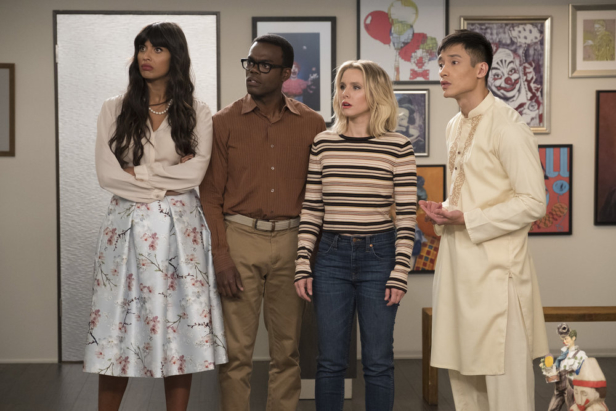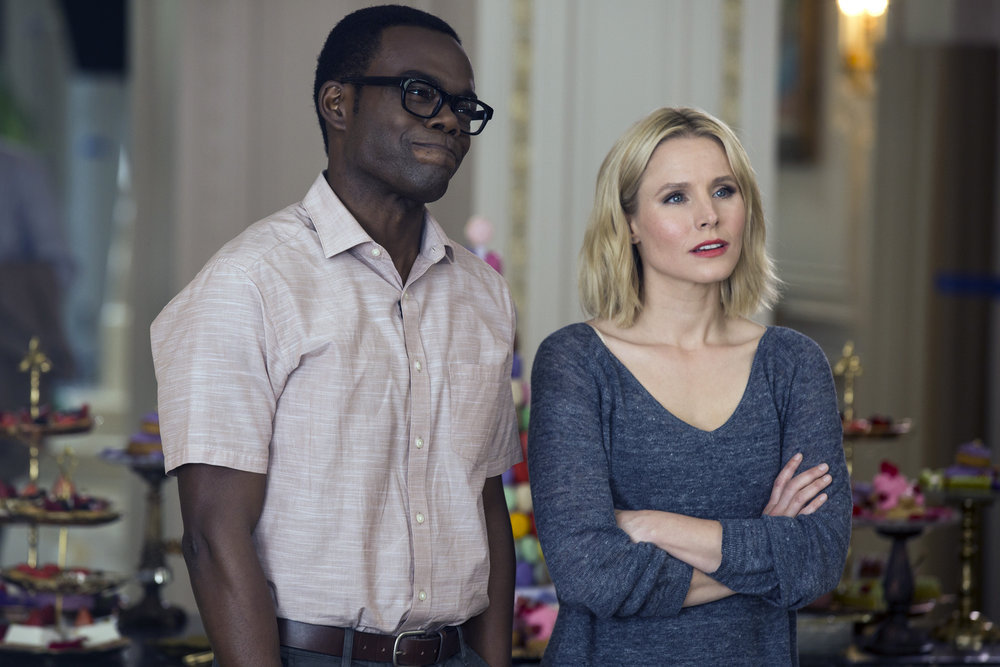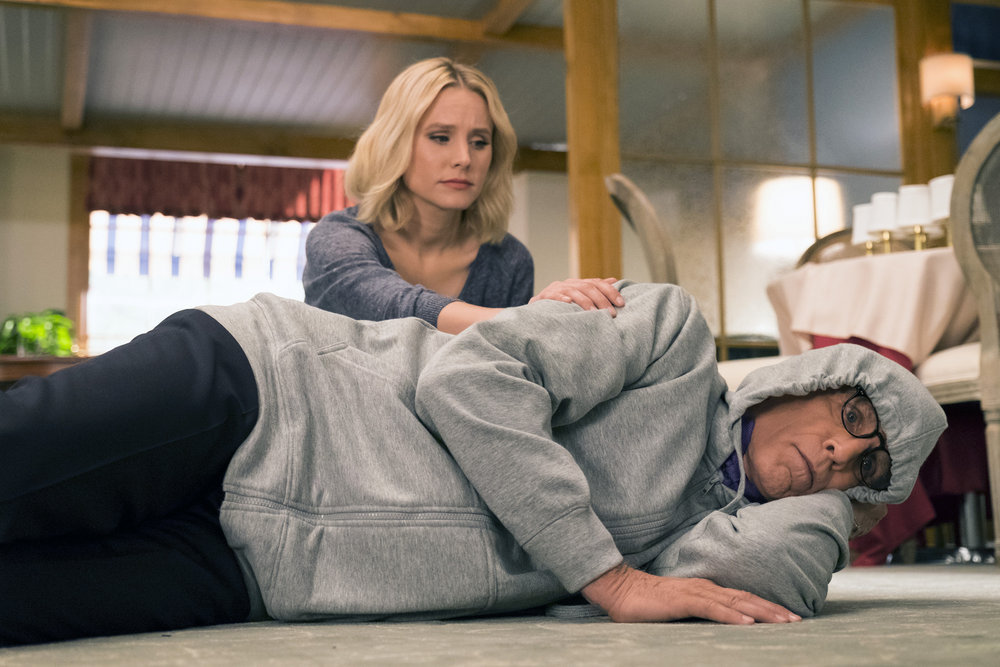With the fourth and final season hitting screens this week, we speak to The Good Place creator Michael Schur and the cast about bringing the afterlife to an end…
The Good Place was just a fun and wacky sitcom when it first premiered on NCB, and later on Netflix in the UK, back in 2016, with the show’s weird premise — a group of recently departed strangers wake up in the afterlife and help each other through weekly hijinks — being enough to tempt potential viewers into adding it to their to-watch lists. But that all changed with the first season’s phenomenal finale (which we will resist the urge to spoil here), which flipped the series completely on its head and made The Good Place a must-watch comedy of epic proportions.
As the story has progressed, the plot twists have continued, creating a high-concept show that feels as fresh as the day it was conceived with each new season premiere. With creator and writer Michael Schur (one of the minds behind The Office, Parks And Recreation and Brooklyn Nine-Nine) at the helm, The Good Place continues to gain new fans every week. We reckon NBC would happily keep it going for as long as possible, but Schur and the rest of the writers’ room don’t want to overstay their welcome and are seeing in the start of the end with the fourth and final season. The Good Place is going out on its own terms, which is a luxury not many series are afforded.
“I’ve been through this a couple of times now where the show that I’ve created or worked on has got to end on its own terms and I’ve been through a couple where the show didn’t get to end on its own terms, and it’s way better when you do it the first way!” Schur laughs. “Especially a show like this, because the show is heavily serialised and it’s telling a very specific story and the characters are on a very specific journey, and it would have been a real bummer if it had been ended artificially. So it really feels like a luxury to be able to call our own shots.”
Happily for Schur, he’s been able to call the shots from the very beginning. “You hear a lot of horror stories about networks interfering with the way people are trying to tell stories, but we’ve had the opposite effect. We’ve been able to do exactly what we wanted to do for better or for worse. We’ve executed exactly the story we’ve wanted to tell, and we’re going to get to end it exactly the way we wanted to, which is really crazy. It’s a real luxury. It shouldn’t be, but it is! I’m extremely grateful that that’s the way it’s unfolded.”
The writers have had an end in mind for a while, Schur tells us. Once they got through the first season and the twist at the end of it, and they knew people liked it and the show was likely to survive, they were able to start planning the finale three seasons in advance. An idea for the ending started to form somewhere in the middle of writing Season 2.
“We’ve been thinking about it for a long time,” he tells us. “I like to have an idea in my head of where we’re going but not completely commit to it, because I like to allow for the possibility that someone will come up with a better idea than the one we have.” The writers cautiously added to the idea over time, filling in holes here and there and shifting things. By the time they got to the third season, they knew exactly how it was going to end.
“When Mike Schur told me what the season was going to look like, what the finale was going to look like and I realised what the ending was, I thought that this couldn’t be better,” says actor D’Arcy Carden, who plays supercomputer Janet on the show. “There couldn’t be a better time to go out. Equally, I selfishly want it to go on, but I don’t want it to go on any longer because the writers have done such a great job. If you like this show, you’re going to really like this ending.”
With the finale in sight, the cast and crew got to appreciate the last season. “We got to really savour it and savour each other and make the most of it,” explains Tahani Al-Jamil actor Jameela Jamil. “There wasn’t an element, even the tiniest morsel, of taking anything for granted, which can sometimes happen when you’re filming 18-hour days in 100-degree heat, but we felt so grateful and lucky and emotional the whole season through.”
“It’s a real opportunity to be able to finish our storyline,” enthuses Manny Jacinto, who plays Jacksonville, Florida-born Jason Mendoza. “Especially with all the content available nowadays, a lot of shows are kind of left to die out or are kind of forgotten, but Mike Schur has a reputation. For one thing, the network has confidence in him and the people around him, the writers, have so much confidence in him that he can pretty much do whatever we wants. We have learned to never doubt Mike. And to end the story on our own terms, especially leaving it on the high, is definitely a rare opportunity. Although it’s very bittersweet, I think audiences and everyone who participated in the telling of the story are happy to be able to give this story a period at the end.”
The Good Place has so far been excellent at executing finales, which leads us to believe that the big talk around the one for Season 4 is more than just hot air. However, after that first finale that went on to upend the show completely, the writers have taken care to do what’s best for the show, to keep the story going, and to not throw in more massive twists just for the sake of throwing in massive twists.
“We were pretty clear after [the first season] that the goal was not to upend the entire show in the same way every year,” explains Schur. “I felt like that was the biggest move we were going to make. There were two reasons for that: one is that it’s very hard to make moves as big year after year, just because there aren’t that many that you can come up with, but also because I pretty strongly felt that working in this space, in what you would call a sci-fi genre space, if you continually throw everything up in the air and flip over the table, I felt like as an audience member I would start to get annoyed at a certain point. It would be like, then what is the reality? What are the rules for the situation here? I didn’t want people to feel untethered to the basic tenants of the show.”
The twists and turns are in the DNA of the The Good Place, with the writers incorporating fun cliffhangers at the end of most episodes and bringing in something bigger at the end of the season. But after that first finale, they never intentionally tried to do something as big as that again. “It felt like if we tried to keep doing that and if we kept saying, ‘Actually, everything you thought you knew you don’t know anymore,’ then it would just start to feel like the show had no grounding in consistency. It would start to feel like it was just flying all over the map. So we certainly do feel a continual pressure to make the show twisty and turny, and have interesting new surprises, but we were pretty explicit that that was going to be the real shocker, that thing that happened at the end of that first season.”
Though it’s riddled with twists, that’s not the only thing that has kept The Good Place fresh all these years. As well as being unpredictable and consistently hilarious, it’s also a real thinking show. And by that we mean it often gets you questioning your life choices and not only what it means to be human but what it means to be alive and to exist. With the premise of the show revolving around a group of bad people learning how to be good by the Good Place’s resident ethics professor Chidi Anagonye (played by William Jackson Harper), it often goes heavy on the study of morality and ethics and the countless philosophies that surround them.
“I pitched the show as an investigation of what it meant to be a good person,” explains Schur. “I had a sense when I developed it, what that meant was something like the study of ethics.” When he began mapping out the show, Schur wasn’t 100 percent sure how much he would end up incorporating actual ethical models and the study of ethical philosophy, but when it was time to start writing the pilot it became clear that the writers would really have to get into it. Laying out all the different ways great figures throughout history have proposed for how to be a good person was the thing that was going to drive the show forward.
“A lot of the early work I did on the show was specifically just reading philosophies or, to be more accurate, Wikipedia summaries of these philosophies,” Schur laughs. “By the time I actually pitched the show to NBC, I said to them, ‘look, this is going to be the backbone to the show, these are dead people who study moral philosophy,’ and I know that’s not a super sexy way to pitch a TV show in the year 2016, but it sort of became clear to me that the only way to do this show properly would be to have them explicitly discussing Aristotle and Kant and the Utilitarians, John Stuart Mill, and all these people who have been thinking about this stuff for hundreds of thousands of years.”
To help the writers understand the theories a little more, the writers’ room would often turn into a seminar room with guest professors regularly joining them to give lectures on philosophy theories. One of their advisors was Pamela Hieronymi, a professor at UCLA who teaches an Intro to Philosophy class. To help prepare for the Season Two episode in which Chidi teaches the team the Trolley Problem, a well-known thought experiment in ethics, the professor came in and explained the Trolley Problem in much the same way that she explains it to her Philosophy 101 students.
“On some levels, working on the show has been like going back to college in the best possible way,” Schur says. “We’re sitting in a room with a bunch of really smart people and we’re investigating and reading a bunch of really difficult stuff and talking about it… It’s just so insane and wonderful and we’re able to do that, that we can be writing on a TV show and have so much fun writing down jokes and also have actual professors come in and teach us actual things about actual philosophy. There are a lot of things about making the show that have been so wonderful and felt like a crazy fever dream, but that’s probably the one that makes this show stand out from other shows. It’s been this kind of group seminar in a wonderfully interesting and complicated subject that my friends and I have all been studying together for four years.”
Amazingly, The Good Place has somehow managed to make the study of ethics not only accessible but funny. “It’s not always easy!” Schur tells us. “Sometimes it’s very easy — tell Ted Danson to have an existential crisis and things get real funny real fast. Sometimes it’s like that, but sometimes it’s like, boy, this is a really thorny, complex and boring idea and we’re going to have to work really hard to figure out how to make it funny. Because it is a network TV show, it has to be entertaining and it has to have jokes in it.”
Something that really helped was the fact that Schur himself finds the study of ethics as boring and frustrating as the characters so. “A lot of Eleanor’s attitude towards the philosophies that Chidi has been teaching her for the better part of three years is also my attitude, which is, ‘ugh, this sucks! This is so boring!’” he laughs. “We have one expert and then a bunch of people who are not only not experts but are continuously annoyed and frustrated at how hard this stuff is to digest. So we let them moan and groan and comment on how impenetrable all the philosophical writings are, and that’s a good way to write jokes.”
This article first appeared in SciFiNow issue 163.
The Good Place Season 4 is available to stream on Netflix UK, with new episodes premiering on Fridays. Get all the latest sci-fi news with every issue of SciFiNow.



